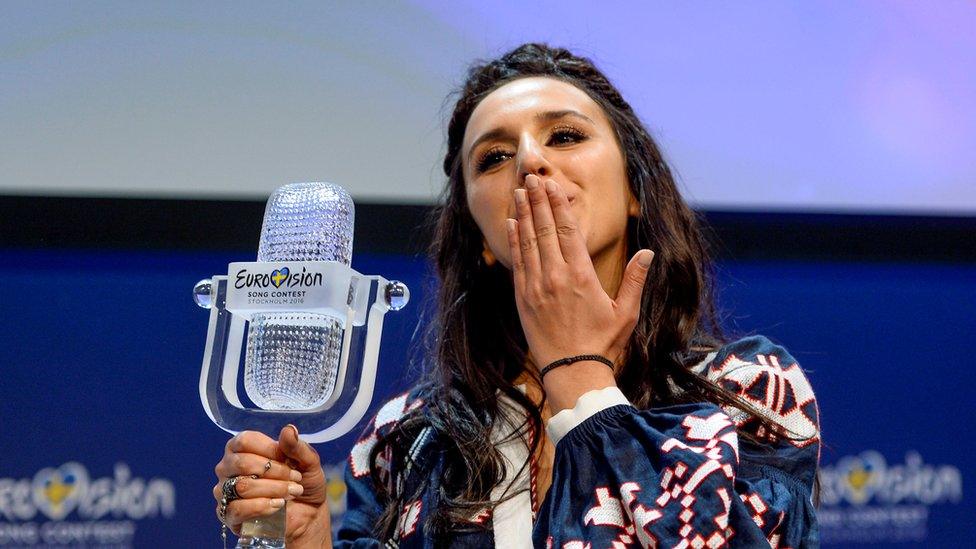Eurovision Song Contest: Mixed feelings over Ukraine's triumph
- Published

Ukraine triumphed over favourite Russia
So Ukraine confounded the bookmakers and Eurovision commentators who had been convinced that Russia - or possibly Australia - would win.
Russia's CG effects and the brilliance of Australia's singing were not enough to defeat jazz artist Jamala.
Russia's Sergey Lazarev had been the bookies' top tip for days, possibly because his song was so similar to 2015's Swedish winner - with innovative staging and a slick song to match.
But Ukraine stole past Russia and Australia under the radar, with the new voting system providing a huge surprise at the 11th hour when Jamala was crowned as winner.
She is the first Crimean Tatar to perform at the contest, and her song, 1944, could not have been further from Eurovision's usual fare.
It deals with Stalin, Crimea and claims of ethnic cleansing. Jamala dedicated it to her great-grandmother and her five children, who were deported by Soviet troops from Crimea in 1944.
Simon Bennett, head of the International OGAE Eurovision fan club, told the BBC that former Soviet countries that would "normally vote for Russia" had sent it a message by voting for Ukraine instead.
'A pointed slap'
Political songs are not allowed at Eurovision, but 1944 was permitted because it was based on historic fact, rather than current politics.
BBC Music reporter Mark Savage wrote in February that Ukraine's 2004 Eurovision winner, Ruslana, had said the song 1944 had struck a chord over current circumstances in the region.
"This song... is precisely what we are all suffering in Ukraine today," she said, referencing Russia's seizure of Crimea in 2014.
Jamala simply said after her win: "I want peace and love for everyone," adding at the press conference: "I was sure that if you talk about truth it really can touch people."
But John Kennedy O'Connor, broadcaster, author and Eurovision expert, was not happy with Saturday's result.
"I'm disappointed that a dirge about genocide and delivering a pointed slap in Russia's face has won this year," he told the BBC.
Fans react to Ukraine's Eurovision Song Contest win
"This contest should never be a political platform and I'm almost angry that it's been turned into one, despite the very clear rule book on the matter."
He said that while third place was an "excellent result", the Russians must be "sick as parrots" at the moment.
Alasdair Rendall, president of the Eurovision fan club OGAE UK, said immediate reaction to Jamala's victory was "mixed".
"Many people admired her strong voice and the impressive visuals on show," he told the BBC.
"However many are already saying it won due to the strong political message it carried rather than its musical quality."
As for Australia, Bennett said it was "neutral and easy to give your votes to" while O'Connor said it was "time for them to go away and start AsiaVision now", referring to a song contest for Asia Pacific countries.
And at the other end of the leaderboard, hopes for the UK's Joe and Jake were dashed when they came third from bottom.
Mixed feelings over Ukraine's triumph
Rendall felt the result was "totally undeserved" and Bennett was "distraught for them".
But O'Connor added: "The fact that their single is not in the UK top 100 after a month [plus] since its release says it all really."
Joe and Jake told the BBC they had given "it their all" and sent "huge congratulations" to Jamala.
The new voting system also got a mixed reception, with Bennett saying it was "a disaster that destroyed the atmosphere"' while Rendall said it had "really ramped up the tension".
It seems that the only thing everyone agreed on was the show itself.
"Congratulations to Swedish TV for putting on one of the most impressive, exciting and high quality Eurovisions ever," said Rendall.